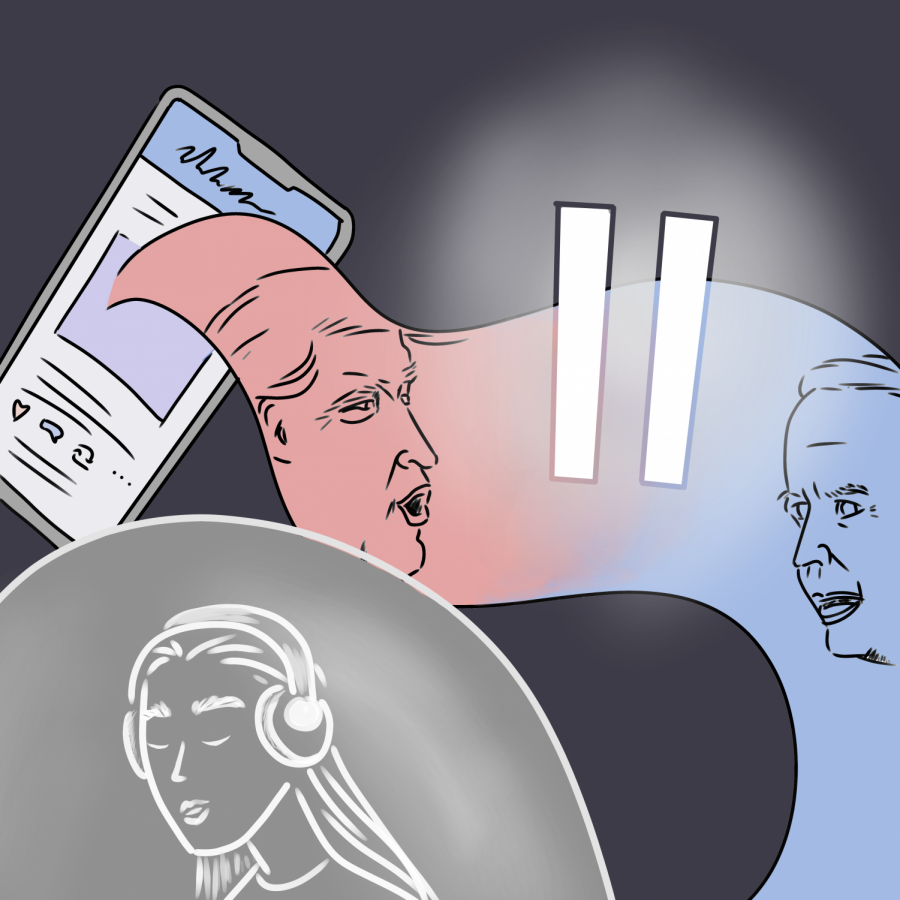Staying Healthy with Saloni: Election edition
Take a step back from the chaos of the election. Limit your intake of news and social media pre-and-post election. Encourage positive conversations rather than heated debates over partisan topics. Practice relaxation techniques, be it yoga, meditation or anything else.
November 1, 2020
How many times a day do you read political tweets? How many times do you scroll through Instagram posts encouraging you to vote one way or the other? How many times have your conversations with friends and family revolved around the election?
For me, it’s infinite.
We’re all suffering from different types of anxiety. In March, we grew anxious over the Covid-19 pandemic and its impact on our health and education. Ever since George Floyd’s murder in May, we’ve been anxious about racial tensions. As a senior, I’m anxious about college applications and the pandemic’s impact on my future. And all along, we’ve been anxious about the election: the big, scary “e-word” that we just can’t seem to stop thinking about.
I’m not surprised that the majority of us are overwhelmed by the 2020 elections and are suffering from “election stress disorder,” according to the New York Times. The stress, anger and anxiety may seem new, but quite frankly, these emotions have only grown since the 2016 election, when our country started to grow more polarized and divided than ever before.
Elections remind us not only of our rights, but also of the civic responsibilities we hold within our democracy. According to a poll by MyVoice, equal access to health care, climate change and the economy are most important to people ages 14-24. Our generation, “Generation Z,” has been actively participating in the 2020 election – whether it’s through taking part in civic engagement (eligible to vote or not), protesting, campaigning, writing petitions or engaging in social media discourse.
Despite the activism, the over-politicization, conspiracy theories and identity crises continue. Across the nation, students’ mental health and wellbeing are at stake as we endure sociopolitical stress from political events and social movements.
Whatever the outcome, there will be a negative reaction; our country is too polarized to escape this fire unscathed. Yet, we must remember that tearing each other down is not the way to cope with the results. Everyone is entitled to their own opinions – even if you don’t agree with them – and we can’t control what others think. Instead, we should respect everyone’s opinions and allow them to express their beliefs.
According to the Washington Post, some private schools will not conduct classes on Nov 3. to support students who work as poll workers. Additionally, some schools will not be conducting classes the day after election day, on Nov. 4, to give students time to deal with post-election tensions, such as the uncertainty of not having a final outcome or the anger of not having the outcome they hoped for.
Even if your school isn’t giving you the day off, if you’d like to, take a step back from the chaos of the election. Limit your intake of news and social media pre-and-post election. Encourage positive conversations rather than heated debates over partisan topics. Practice relaxation techniques, be it yoga, meditation or anything else.
Our country’s motto is “united we stand, divided we fall.” Right now, we could not be more divided. Rather than tear each other apart, let’s stand together – regardless of political views – and unite with love and compassion. That’s the only way to move forward.


















![“[Building nerf blasters] became this outlet of creativity for me that hasn't been matched by anything else. The process [of] making a build complete to your desire is such a painstakingly difficult process, but I've had to learn from [the skills needed from] soldering to proper painting. There's so many different options for everything, if you think about it, it exists. The best part is [that] if it doesn't exist, you can build it yourself," Ishaan Parate said.](https://harkeraquila.com/wp-content/uploads/2022/08/DSC_8149-900x604.jpg)




![“When I came into high school, I was ready to be a follower. But DECA was a game changer for me. It helped me overcome my fear of public speaking, and it's played such a major role in who I've become today. To be able to successfully lead a chapter of 150 students, an officer team and be one of the upperclassmen I once really admired is something I'm [really] proud of,” Anvitha Tummala ('21) said.](https://harkeraquila.com/wp-content/uploads/2021/07/Screen-Shot-2021-07-25-at-9.50.05-AM-900x594.png)







![“I think getting up in the morning and having a sense of purpose [is exciting]. I think without a certain amount of drive, life is kind of obsolete and mundane, and I think having that every single day is what makes each day unique and kind of makes life exciting,” Neymika Jain (12) said.](https://harkeraquila.com/wp-content/uploads/2017/06/Screen-Shot-2017-06-03-at-4.54.16-PM.png)








![“My slogan is ‘slow feet, don’t eat, and I’m hungry.’ You need to run fast to get where you are–you aren't going to get those championships if you aren't fast,” Angel Cervantes (12) said. “I want to do well in school on my tests and in track and win championships for my team. I live by that, [and] I can do that anywhere: in the classroom or on the field.”](https://harkeraquila.com/wp-content/uploads/2018/06/DSC5146-900x601.jpg)
![“[Volleyball has] taught me how to fall correctly, and another thing it taught is that you don’t have to be the best at something to be good at it. If you just hit the ball in a smart way, then it still scores points and you’re good at it. You could be a background player and still make a much bigger impact on the team than you would think,” Anya Gert (’20) said.](https://harkeraquila.com/wp-content/uploads/2020/06/AnnaGert_JinTuan_HoHPhotoEdited-600x900.jpeg)

![“I'm not nearly there yet, but [my confidence has] definitely been getting better since I was pretty shy and timid coming into Harker my freshman year. I know that there's a lot of people that are really confident in what they do, and I really admire them. Everyone's so driven and that has really pushed me to kind of try to find my own place in high school and be more confident,” Alyssa Huang (’20) said.](https://harkeraquila.com/wp-content/uploads/2020/06/AlyssaHuang_EmilyChen_HoHPhoto-900x749.jpeg)








